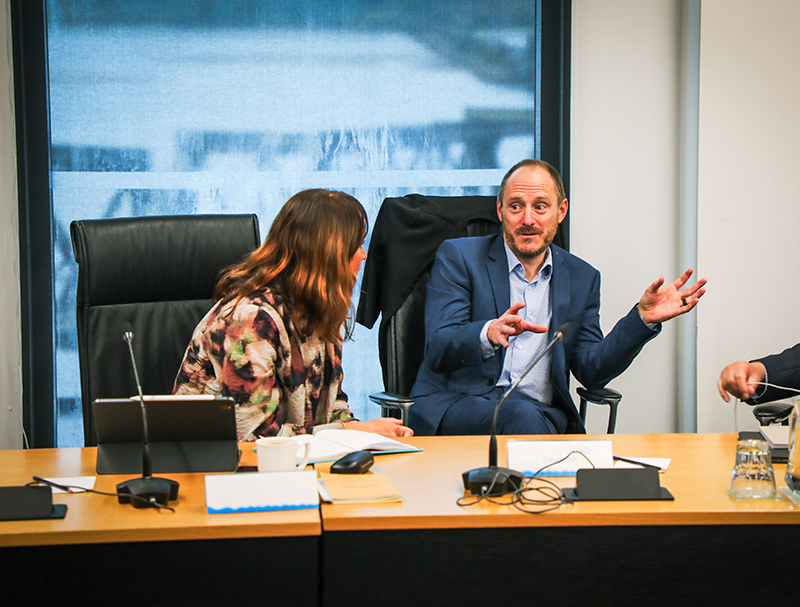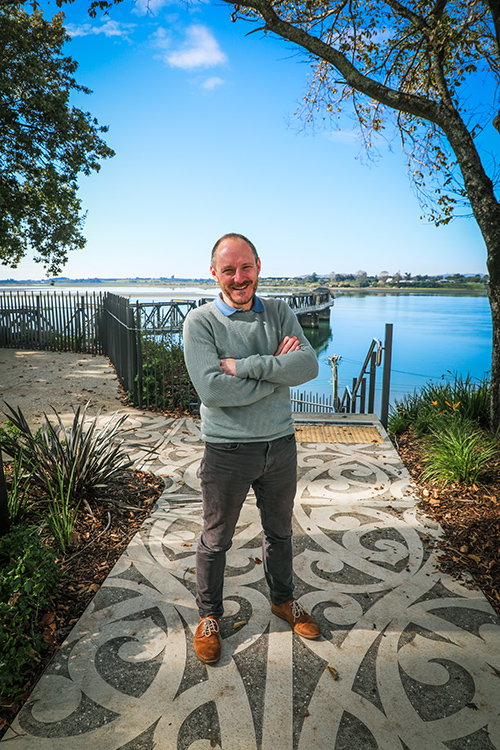Behind every elected member is a team of people keeping the machine of local government moving, to support and enable good decision making for the benefit of our communities.
‘The Message’ by 1980s American hip-hop artist Grand Master Flash blasts out a small speaker, the rhymes and rhythms filling a meeting room at Regional House – the headquarters of Toi Moana Bay of Plenty Regional Council.
Twenty-or-so local government employees listen along. They’re here to learn about Elections and the role they have in the democratic process. From the outside looking in, it’s an unlikely scene on a Tuesday afternoon, but using hip-hop to explain the nuances of government is something Governance Manager Steve Groom is familiar with.
“The idea first came along when I was working at the Beehive, where I did a presentation around the Official Information Act. I’ve found that the unexpected is a good way to hook people in beyond slides on a PowerPoint – and when you’re talking about governance, hip-hop is generally unexpected.”
A self-described “unlikely listener” of the genre, Steve’s love for hip hop started in the early ‘90s where he was involved in the Tauranga Boys’ College basketball team (which he’d later go on to captain).
Much like the unique combination of hip hop and governance, Steve says his eclectic interests began at a young age, as he juggled sport (basketball, cricket, tennis and a bit of everything else) alongside his academic pursuits, including debating.
And while basketball is more of a pastime these days, debate – or the art of persuasion – plays a key role in his job supporting the business of Regional Council.
“Persuasion isn’t a dirty word,” says Steve. “The ability to be persuaded and persuade others is critical to good governance… because otherwise it would just be people yelling at each other.
“There’s a balance to be had. I believe elected representatives need to be open minded enough to take into account the evidence and information in front of them, to hear different views, and then ultimately lean on their values to help guide them in the decisions they make for our region.”
As Governance Manager, Steve’s role is to help ensure that the Regional Council operates transparently and effectively, to create a strong foundation for democracy to happen. He and his team are the “grease in the machine” between the public, the decision makers (elected members) and the staff responsible for delivering on those decisions.
A key part of this is supporting 14 elected members and managing the logistics of council meetings.
“Every term we have nearly 300 meetings, workshops, briefings and other forums,” Steve explains. “Meetings are the shop front of decision making and, while I might be biased, my team does an amazing job of operating that shop front.
“Every one of those meetings has an agenda, which can run into hundreds of pages with technical information. We will live stream the meetings, capture minutes and action items from that, and make sure that information is publicly accessible.
“Transparency in decision-making is really important to my team, and we put a lot of effort into making meeting documents public and ensuring the public can attend our meetings or watch them from the comfort of their homes.”

This year marks Steve’s second year with Regional Council after a 20-year stint in central government, including in two Ministers’ offices. While being in the Beehive and seeing the inner workings of governance at a national level was an unforgettable experience, Steve reflects that he enjoys the immediacy of being at the Regional Council.
“Working in Ministers’ offices was a weird mix of the most glamorous and most mundane all rolled into one. One minute, you’d be in a meeting with the Minister of Finance or the Prime Minister and think, ‘I’ve made it’ and then come out and spend the rest of your day doing battle with a photocopier. I’m not sure which was more stressful,” he says with a laugh.
“But my enduring memory is the absolute grind that comes with the life of a minister and that there’s no little decisions to be made when it comes to the future of New Zealand.
“Here, I love being able to support decisions getting made that you can then see in the community. You see examples of this every day. My family and I head to the upgraded Pāpāmoa Hills Regional Park and each time I think, ‘Me and my team were part of the process that led to this.’”
This year will be his first time supporting the Elections process for the Regional Council. Generally speaking, fewer people vote in local body elections (turnout for the Regional Council was under 40% in 2022), so increasing voter turnout and engagement in local elections is something Steve is passionate about.
“Local elections are important because they're the way that you decide what type of community you want to live in. Your vote has a real-world impact on who represents you and the decisions that get made around the council table.”
Steve believes that democracy works best when it reflects the community it serves.
“People should see themselves reflected in the people they choose to represent them. The diversity of representation leads to better governance.”
He encourages anyone who looks at council decisions and thinks, "I could do that”, or, even better, “I could do that better” to stand for council.
“It's incredible purpose-driven work. The decisions you make will have a direct impact on the community you're in, and you'll get to see the decisions that you make coming to fruition in front of you – not just for your community now, but for future generations.”



